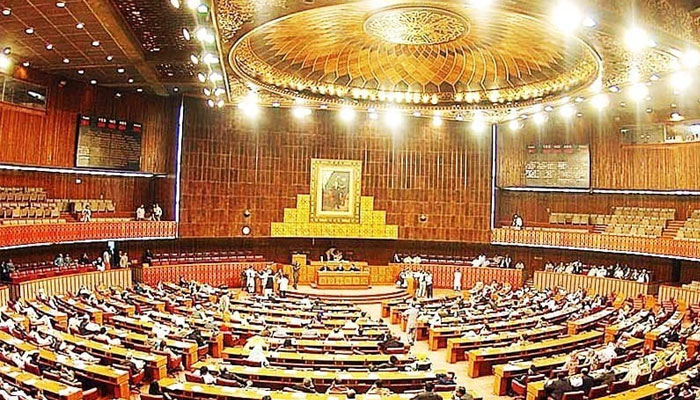Sanctity of parliament
Bilawal has made an important and timely appeal for restoring the sanctity of parliament
PPP Chairman Bilawal Bhutto Zardari has made an important and timely appeal for restoring the sanctity of parliament in his recent address to the National Assembly. His remarks come at a critical moment, as Pakistan’s political climate has been deteriorating due to increasing polarization and hostility between rival parties. In this context, the PPP chairman has invited political parties to unite for a ‘New Democratic Charter’. Bilawal did not spare criticizing the recent arrests of PTI lawmakers after their September 8 rally, calling them echoes of the previous government, led by Imran Khan, which often targeted its political opponents. The PPP chairman’s warning may be simple but history shows how true it stands: today it may be the PTI, but tomorrow it could be another party. The vicious cycle of political victimization, if allowed to continue, will render politics in Pakistan a mere spectacle, devoid of substance and credibility.
Parliament is supposed to be the highest platform for debate on issues that matter to the public. It exists to facilitate legislation that serves the people, to foster debate, and to hold the government accountable. Instead, it has increasingly become a battleground for personal insults and vendettas. When parliamentarians spend their time trading insults rather than addressing public concerns, they betray the very people they claim to represent. As Bilawal has rightly noted, the real victims of this bitter hostility are the people of Pakistan and the democratic system itself. If parliament is to regain its dignity, it is imperative that parliamentarians begin to treat each other with respect and maintain a working relationship when it comes to their duties. Legislative business must be debated thoroughly, not bulldozed through without discussion. Genuine grievances can be aired, but personal attacks and name-calling should have no place in the halls of parliament. When the conduct of lawmakers deteriorates, public confidence in the system erodes, and space opens up for undemocratic forces to step in and exploit the situation.
The idea of a ‘New Democratic Charter’ may not be novel but it is very timely – especially given the past week in Pakistani politics. The fact all our political stakeholders need to learn is that political rivalries are natural, especially during election campaigns – but once inside parliament, the focus should shift to governing for the public good. Previous attempts, like the Charter of Democracy and the Charter of Economy, offered by the PPP and PML-N to the PTI during Imran Khan’s tenure, were dismissed by the PTI. This was a missed opportunity to create a framework for constructive engagement and mutual respect in the political arena. Now, with the country more polarized than ever, it is time for the PTI and other political parties to reconsider such offers. Why can’t parliamentarians establish their own red lines – limits on what can and cannot be said or done within parliament? This lack of unity and discipline among parliamentarians not only undermines parliament’s authority but also emboldens undemocratic forces. Is it not time – finally – that our political leaders put aside their differences? The challenges facing the country are too great to be addressed in a fractured, dysfunctional political environment. Pakistan’s political class is not only failing itself but also jeopardizing the future of the country’s democracy.
-
 AI Innovation Could Make Trade Secrets More Valuable Than Patents, Says Billionaire Investor
AI Innovation Could Make Trade Secrets More Valuable Than Patents, Says Billionaire Investor -
 King Charles Heckling: Calls For 10 BAFTAs And A Knighthood For Sign Language Interpreter
King Charles Heckling: Calls For 10 BAFTAs And A Knighthood For Sign Language Interpreter -
 Kim Kardashian Leaves Meghan Markle 'upset' With Latest 'cheap Shot'
Kim Kardashian Leaves Meghan Markle 'upset' With Latest 'cheap Shot' -
 Royal Expert On Andrew, Sarah Ferguson’s ‘entitled’ Behaviour Since Marriage
Royal Expert On Andrew, Sarah Ferguson’s ‘entitled’ Behaviour Since Marriage -
 Instagram And YouTube Accused Of Engineering Addiction In Children’s Brains
Instagram And YouTube Accused Of Engineering Addiction In Children’s Brains -
 Trump Reached Out To Police Chief Investigating Epstein In 2006, Records Show
Trump Reached Out To Police Chief Investigating Epstein In 2006, Records Show -
 Keke Palmer Praises Actor Who Inspired 'The Burbs' Role
Keke Palmer Praises Actor Who Inspired 'The Burbs' Role -
 Humans May Have 33 Senses, Not 5: New Study Challenges Long-held Science
Humans May Have 33 Senses, Not 5: New Study Challenges Long-held Science -
 Kim Kardashian Prepared To Have Child With Lewis Hamilton: 'Baby Using A Surrogate'
Kim Kardashian Prepared To Have Child With Lewis Hamilton: 'Baby Using A Surrogate' -
 Internet Splits Over New York's Toilet Data Amid Bad Bunny's Super Bowl Show
Internet Splits Over New York's Toilet Data Amid Bad Bunny's Super Bowl Show -
 Prince William Inspects Saudi Arabia's Efforts To Promote Football In Young Girls
Prince William Inspects Saudi Arabia's Efforts To Promote Football In Young Girls -
 Northern Lights: Calm Conditions Persist Amid Low Space Weather Activity
Northern Lights: Calm Conditions Persist Amid Low Space Weather Activity -
 'Look What Andrew Has Done': Meghan Markle Defended On Jeremy Vine Show
'Look What Andrew Has Done': Meghan Markle Defended On Jeremy Vine Show -
 Apple, Google Agree To Make 'app Store' Changes Over UK Regulator Concerns
Apple, Google Agree To Make 'app Store' Changes Over UK Regulator Concerns -
 Autodesk Files Lawsuit Against Google Over AI Video Tool Trademark Dispute
Autodesk Files Lawsuit Against Google Over AI Video Tool Trademark Dispute -
 San Francisco 49ers Player Shot Near Post-Super Bowl Party
San Francisco 49ers Player Shot Near Post-Super Bowl Party




